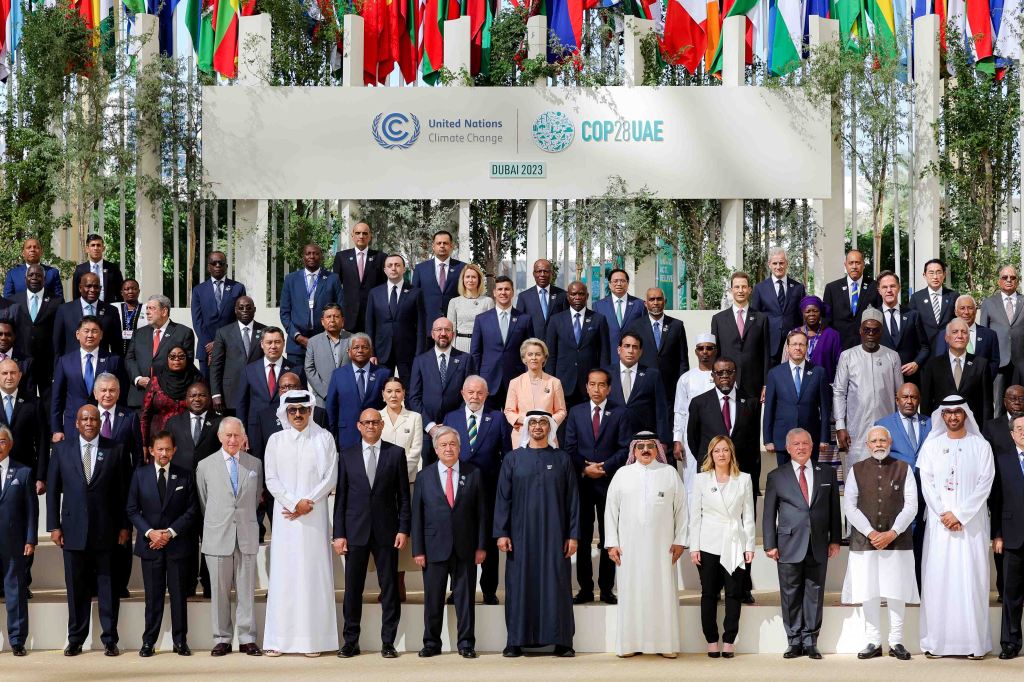Summary
The COP28 climate talks in Dubai ended with a landmark agreement, marking the first global commitment to transition away from all fossil fuels. Led by the UAE’s Sultan Al Jaber, the deal gained support from major players like the US and the EU while appeasing oil-producing nations like Saudi Arabia. Although not a complete phase-out, the agreement emphasizes a swift and orderly shift to clean energy, with provisions for global collaboration. Notably, it was an oil company executive who spearheaded the deal, highlighting industry interest in fossil fuel diversification. Despite falling short of some expectations, the agreement sets new precedents by acknowledging the need to move away from oil and gas. Previous pledges, like coal phase-outs, have seen limited success. However, the Dubai agreement signals a clear trajectory toward a low-carbon energy system, with targets to ramp up renewable energy deployment and efficiency gains. Additionally, it establishes a fund to address climate change losses and damages. The deal’s language sends a strong message to investors, signaling a shift toward renewable energy as a more viable long-term investment. Although talks on a new carbon offsets market collapsed, the agreement still marks a diplomatic victory for the UAE, despite controversy surrounding Al Jaber’s role. Despite opposition from oil-producing nations like Saudi Arabia, the final agreement reflects a global consensus to address climate change, albeit with compromises.

The COP28 climate talks in Dubai concluded with a historic deal that committed the world to a transition away from all fossil fuels for the first time ever at a global climate conference. The president of this year’s UN-sponsored summit, the UAE’s Sultan Al Jaber, brokered an agreement that was strong enough for the US and European Union on the need to dramatically curb fossil fuel use while keeping Saudi Arabia and other oil producers on board. The final agreement is a call for countries to quickly shift energy systems away from fossil fuels in a just and orderly fashion, qualifications that helped convince the skeptics. Under the deal, countries also are called to contribute to a global transition effort — rather than being outright compelled to make that shift on their own.
The so-called “UAE Consensus” concludes one of, if not the hottest year on record, which led to droughts, scorching wildfires, and other horrendous disasters affecting humanity as a whole from pole to pole. “Together we have confronted the realities and sent the world in the right direction,” said Al Jaber, who’s also chief executive officer of Abu Dhabi National Oil Co. He brought the gavel down to confirm the deal on Wednesday, a day later than scheduled. It was met with applause and cheers by delegates. What was most interesting about the deal that was reached, was that it came from an oil company, before it came from an actual country, a major indication of the industrie’s interest in moving away from fossil fuels. While the outcome did fall short of the specific fossil fuel “phase out” most countries had planned on implementing, it does break new ground: No previous COP text has mentioned moving away from oil and gas, the fuels that have underpinned the global economy for decades.
After a pledge to phase down coal in Glasgow two years ago, consumption has continued to rise and the world remains very unlikely to limit warming to the Paris Agreement’s target of 1.5C. This time around, the agreement leaves ‘wiggle room’ for burning natural gas as part of the transition to clean energy. Still,
the Dubai decision is an important marker in the global direction of travel toward a low-carbon energy system. The text also includes agreements to triple the deployment of renewable power and double the rate of efficiency gains by the end of the decade. A separate COP28 agreement, reached at the start of the summit, makes operational a hard-fought fund for addressing the losses and damages of climate change. “An agreement is only as good as its implementation. We are what we do, not what we say,” Al Jaber said. “We must take the steps necessary to turn this agreement into tangible actions.” The COP28 language pushing a decline in fossil fuel use will send a signal to investors about the future of energy markets, said Jennifer Morgan, Germany’s climate envoy, as she was leaving the final plenary meeting at Dubai Expo City. “We now tomorrow move forward in implementing this,” Morgan said. “Every investor should understand now that the future investments that are profitable and long-term are renewable energy — and investing in fossil fuels is a stranded asset.” Investors were also watching for progress on a new carbon offsets market overseen by the United Nations, but talks on that front collapsed after the European Union and some Latin American countries led a push for stricter standards. That means the launch of the program, which governments will be able to use to meet their green pledges, will be delayed. The last-minute deal is a diplomatic win for the UAE and Al Jaber, whose role at Adnoc made him a controversial choice to preside over this year’s talks. There have been hiccups – allegations he used his role to lobby for oil deals and an argument over the science of climate change – but in the end he will argue he delivered. Al Jaber used his presidency to bring the oil and gas industry firmly into the COP process and there were more representatives of fossil fuel companies than at any previous summit,
drawing criticism from climate activists. He forged a pact between more than 50 companies to reduce emissions from their own operations. It said nothing about levels of oil and gas production, but a pledge to reduce pollution from methane – 80 times more dangerous than carbon dioxide – to near zero by the end of the decade could have a material impact on emissions. That didn’t prevent Saudi Arabia from leading a rearguard action against any attempt to include a fossil fuel phase-out in the text. As COP28 got into full swing, the kingdom’s Energy Minister was asked by Bloomberg News if he’d be happy to see a phase-down in the text. “Absolutely not,” he replied. The Organization of the Petroleum Exporting Countries later sent a letter to members, asking them to lobby against any text that targets fossil fuels rather than emissions. While the final language was watered down to reflect their concerns, ultimately the coalition of oil producers was left too isolated to resist. “The much-criticized UAE Presidency has pulled this off,” said Professor Myles Allen, at the University of Oxford. “Everyone seemed ready to write COP28 off just 24 hours ago, you have to hand it to them.”







You must be logged in to post a comment.